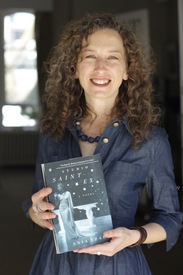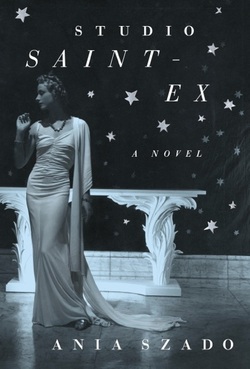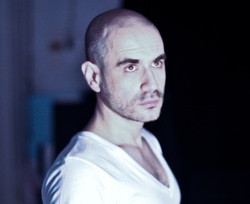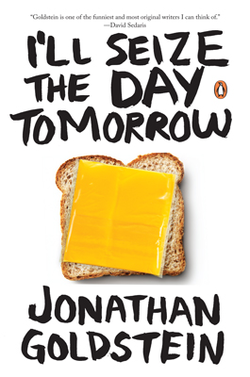 Ania Szado Ania SzadoPhoto by Katrina Afonso Ania Szado's acclaimed second novel, Studio Saint-Ex (Viking Canada/Knopf USA) has been sold to five countries. Her debut novel Beginning of Was (Penguin Canada) was regionally shortlisted for the Commonwealth Writers' Prize, Best First Book. Her short fiction has been published in numerous literary magazines and anthologized in All Sleek and Skimming (Orca, ed. Lisa Heggum). Ania's nonfiction has appeared in the Globe & Mail and Flare Magazine. She lives in Toronto and holds an MFA in Creative Writing from University of British Columbia and an AOCA from Ontario College of Art. Visit her website or follow her on Twitter: @AniaSzado. RUSTY TALK WITH ANIA SZADO Kathryn Mockler: What is your first memory of writing creatively? Ania Szado: I remember writing the copy for a "Best of the West" newspaper that covered the goings-on of the cowboy action figures that my brother and I played with when we were little... but my strongest early memory is less pleasant. I wrote a poem in the style of Dr. Seuss. It must have been pretty good. My teacher insisted that I had to have plagiarized it, though I hadn't. That soured me on writing for a while. KM: Why did you decide to become a writer? AS: I had been doing visual art, but I'd always wanted to write. It took me a while to get up the courage—I was a voracious reader and was pretty much in awe of writers; I didn't dare imagine I could be capable of being one myself. When I finally made the decision to swallow my insecurities and hone my writing skills, I found that I was more creative and committed as a writer than I was with paint. I found my direction and voice slowly, but right from the start, the work I was producing seemed to have more potential than anything I'd produced as a visual artist, and the act of writing was intensely satisfying. KM: What is the best piece of writing advice you’ve been given that you use? AS: It wasn't advice so much as a description of a way of working. I took a novel class with Catherine Bush when I was doing my MFA, and she mentioned that she sometimes leaves the manuscript, and just sits on the sofa with a notebook, asking and answering questions about the work-in-progress. That opened the door for me to adjust my own process along similar lines, and I think it has helped my writing immensely. KM: Can you describe your writing process? AS: The one thing that is consistent in my writing process is that I have to get away, now and then, to completely immerse myself in my work. I do writing retreats of between a week and a month. I'll write for minimum 15 hours a day; my longest stretch was 22 hours. Most days I don't step outside. I eat simple foods, the same thing every day. No radio or TV or music or news. I think of nothing but the story world; I don't even leave it when I'm asleep. I've done this for first drafts and I've done it for rewrites. I'm always anxious before I begin, but I set up immediately and start working right away, and then it's just the bliss of intense, satisfying work and creative intellectual challenge. When I'm not on retreat, I might write several hours a day or not at all—it depends on the stage I'm at in a novel and whether there are other pressing demands on my time. When I'm working, I shift between writing on the laptop and working things out in a notebook. KM: What is your favourite or funniest literary moment, if you have one? AS: What springs to mind is one of the coincidences that came up during the writing of Studio Saint-Ex. A character in the novel, Saint-Exupéry's real-life friend Bernard Lamotte, had his painting studio on East 52nd Street in NYC in the 1040s; there's a plaque on the building to commemorate Saint-Ex's working on The Little Prince there. I created a social club for the city's French expats, called it the Alliance Française, and placed it across the street from Lamotte's studio—in what is actually the Cartier building. Some time later, I queried a contact at today's Alliance Française about the history of the organization. She told me that the organization was itinerant in the early '40s; they borrowed space as they needed it. When she went into the files, she discovered that one of the buildings they used in the early '40s was actually the Cartier building. What's more, the modern-day Alliance had, until recently, owned a Lamotte mural. The woman told me she herself had been responsible for auctioning it off. She'd had no idea Lamotte and Saint-Exupéry had been friends. KM: Tell us about your new novel Studio Saint-Ex? AS: Studio Saint-Ex tells the story of Antoine de Saint-Exupéry writing The Little Prince in early 1940s Manhattan, through the eyes of two women vying to win his heart and save him from his inevitable fate while also grappling to achieve status and success of their own. One is a young fashion designer; the other is his fiery estranged wife. The Little Prince runs throughout the book as a symbol of passion, love and destruction. KM: How did you approach the research for this project? AS: I began by researching Antoine de Saint-Exupéry, first by reading one after another of his many biographies. I read or reread his novels and other writing, including his letters. I was most interested in his NYC years, when he was writing The Little Prince, and eventually I pieced together the other elements of the story I wanted to tell. That led to research on WWII New York, the beginnings of American haute couture, the French expat community in Manhattan, and numerous other side roads. I had a great resource in a Saint-Exupéry scholar who took me on tireless walking tours of Saint-Ex's NYC locales and sent me packages of useful material. I had the insights of my seamstress mother and designer sister to draw on to supplement my research into sewing, fabrics, and the fashion industry. All the while, I was writing, working out the story—and revising it as the research revealed new possibilities or roadblocks. KM: What are you working on now? AS: I'm in the early stages of exploring two very different ideas for the next novel. One involves two artists. The other has to do with a lost—and found—child.  ANIA SZADO'S RECENT NOVEL Studio Saint-Ex, Penguin Canada, 2013 Description from the Publisher: In the glittering world of Manhattan's French expats and 1942 Quebec, a twenty-two-year-old fashion designer on the cusp of launching her career is swept away by the charms of French writer and war pilot Antoine de Saint-Exupéry ... and enmeshed in the schemes of his beautiful, estranged Salvadoran wife, who is determined to win back her husband—at all costs and seductions. With Paris under occupation by Hitler's troops, New York's Mayor LaGuardia vows to turn his city into the new fashion capital of the world—and Mig Lachapelle leaves Montreal for New York to make her name. She finds herself pulled into a fiery romantic triangle in which ambitions, creativity, and passions catch a literary giant between two talented, mesmerizing women and imperil the fate of his work-in-progress, The Little Prince—a poignant tale of a young boy's loneliness and love among the stars, one of the best selling and most beloved novels of all time. Read an excerpt here.  Jonathan Goldstein Jonathan Goldstein’s writing has appeared in The New York Times Magazine and Nerve. He is a columnist for the National Post and a frequent contributor to the PRI’s This American Life. He’s the author of the short story collection Ladies and Gentlemen, The Bible! and the novel Lenny Bruce is Dead. His CBC Radio show, WireTap, is now it its ninth season. In his most recent book, I’ll Seize the Day Tomorrow, Goldstein recounts the highs and lows of the last year in his thirties. RUSTY TALK WITH JONATHAN GOLDSTEIN Melanie Chambers: What is your writing process like? Jonathan Goldstein: I’m fortunate to have the radio producing aspect of the job to toggle between, so when writing isn’t coming as easily, there’s always other things to do such as cutting tape, hopping in and out of the studio—sometimes they’re welcome. And sometimes they can be distractions. It’s hard to tell when you should just push through or give up and do something else. Lately, in terms of process, I’m in the middle of writing a monologue to be spoken by a train conductor. The premise is kind of absurd: as the train is pulling into Penn Station, he announces that all the toilets of New York City and the five Burroughs have been shut down by authority of the New York Toilet Authority. The NYTA. It’s a ridiculous premise, but more often than not, the most satisfying part of writing is actually hearing the work performed by the people that we’re getting to do it. For example, this week’s show I wrote a part for a 14-year-old and found this talented boy named Ezra to perform this piece about falling in love and negotiating your friends during that time when you’re a teenager. I just heard the final mix of it yesterday and that was really gratifying because it turned out really nicely; sometimes they don’t turn out as well as when you hear them in your head, but this time it really matched the way I heard it in my head which is really satisfying. MC: You’re prolific in print and radio. Which do you prefer? JG: It really depends. Having the opportunity to write for different venues can really help access different parts of your brain and inspire different ideas. Last summer I was given a chance to go to Bali for a travel website, and I had never done anything for them before, and the editor was great in the sense that he liked my writing and pretty much had given me carte blanche to write about whatever I wanted to. And having that kind of opportunity you want to step up to it. One of the difficult things about writing for WireTap for so many years—and it creeps up on you—is the persona begins to take over. You become very good at writing in a particular kind of voice. I think of that line of Kurt Vonnegut’s about being careful about the things you pretend to be because you become that thing. I know how to write a particular kind of thing well enough to get the job done in a certain context. It’s a great thing, and it’s the benefit of age, but it can also sort of trap you so having the opportunity of writing for another venue and step outside of the persona can really be exciting. It’s sort of like going away on a vacation and then coming home; I always think of the radio show as a kind of coming home. And I like writing for This American Life too because I love writing for my friends who work there—imagining them reading it and trying to make them laugh and thinking about the things that will make them laugh. It’s kind of like a performance and that can really be fun too. Writing for print, you can be more digressive, and you can try to do things that maybe on the radio you’d fear. On the radio you’re taking people by the hand and you constantly want to be sensitive to the fact that quite possibly they are multi-tasking: sitting in traffic, doing dishes. You want to keep them on board whereas writing for the page you have someone’s undivided attention. I guess you can attempt different kinds of things because of that. MC: What is your first memory of writing creatively? JG: I started writing at a very young age. And I think I was lucky enough to know that was what I liked to do. My first memory is of writing a poem in grade five and having the teacher have me read it out loud in class. What connected me [to that moment], was the actual act of reading it out loud; hand-in-hand with my first experience with writing was performing the writing, if you want to call it that. I think it was the first time I ever felt that kind of specialness. I wasn’t a great student, and I felt like it was the first time that everyone in the class was looking at me but in a positive way and the teacher was singling me out. I remember that feeling of being looked at in that particular kind of way. That was a new feeling and I think I liked it. I think it’s also connected to how my mind works: I’m not very good in the moment, and I’m the kind of person who thinks constantly, regretful about the things I should have said. Writing is a way of slowing down time and getting it right in a way—revisiting the past and having the time to pour over a particular moment. And, do it justice in retrospect. As far as being an introvert, when I think about my truest self, which always takes us back to childhood, I think about a kid by himself in his room. Coming into my 40s, I think I enjoy people. I think now I feel freer with people. I feel more comfortable expressing my enjoyment of people. That’s all there is. There is a great quote I remember Tom Wolfe speaking on 60 Minutes. He said: “our soul is our relationship to other people.” I think it’s true. That’s kind of why it’s worth going out into the world. MC: What do you think about the Internet print medium, and what will it do to print journalism? JG: The first book I ever published was from Coach House in Toronto; they do small experimental titles. This was back in the 90s, maybe even the mid 90s, and I remember the guy who ran the press, now in retrospect I realize he was quite forward looking, but the Internet was something quite new, and he was discussing the possibility of maybe publishing my book as an e-book. I never even heard of such a thing, and I didn’t know the commerce of it all. They had an authors’ tip jar you could put your credit card in, and I remember thinking, this doesn’t appeal to me. I wanted to get published. I wanted to have a book. It was so synonymous with being out in the world and being published. And I remember he referred to the book as the fetish object known as the book, and it just seemed so far thrown to me and now it doesn’t seem as crazy. And, in fact, I love reading on my iPhone. I don’t have an iPad and I don’t have an e-reader. It’s [iPhone] in my pocket, and I’m obsessed with reading, so this way when I’m on the subway or eating, I can always be reading something. The last thing I read on my iPhone was The Onion AV Club. MC: Where did you come up with the idea and why did you decide to write about turning 40? JG: I guess that was the next thing that was happening and that was an easy pitchable single sentence kind of thing. Had I been turning 30, I don’t think it would have had the same type of gravity. But, the truth is, not much changes. The book starts on that note or sort of how most of the time we’re not thinking about how old we are and we kind of are all ages at once. I think the irony in writing about turning 40, the conclusion that I came to, is that I guess you’re never going to feel as though you’ve arrived. I mean 40 when you’re 20 means a different thing then when you’re at 40. So which definition do you adhere to? I’m thinking of a particular episode of Taxi, a great show from the 80s. Bobby [a taxi driver] had given himself five years in New York to become an actor and this was the week that the five-year limit was up. So, he goes on a binge of auditions in the hopes of giving it a big push, and at the end of the week, he gets no callbacks and nothing happens. It’s kind of a sad moment, then he picks up his head, and says, “you know what? I’m going to give myself another five years.” You might think, my life isn’t where I thought it would be at the end of my 30s, but life isn’t over and you can give yourself more time—it’s a gift to yourself. No one can count you out as long as you don’t count yourself out. There is a lot of unhappiness brought about thinking you have to be at a certain place. Look at Michelangelo’s early sculptures verses the later stuff. If you look at an early pieta, like when he’s in his early 20s, it’s like showcasing every single thing that he could do, and it’s incredible. The later stuff is simpler; it’s like he has less to prove. There depth that comes out of that, too. MC: What is your advice for young writers? JG: The 20s are a good time for living, and you’re going to be drawing from that later on. You might as well be pursuing your passions and figuring what the hell you want to do so that maybe in your 30s you can get going in some real way, but maybe that’s my experience because I didn’t have a job in the field I wanted to work in until my 30s. Sometimes it’s easy to be dismissive of the things that you’re naturally good at or to undervalue them. And I’m thinking of Edgar Allen Poe. He always wanted to be a poet. He looked at his short stories, a genre that he kind of invented, as just a means to paying the bills. I don’t think he took it as seriously. But, in the final analysis, it doesn’t matter. And, I also think what separates the pros from the amateurs is being able to write in spite of inspiration—when it doesn’t feel like a hot time and you’re struggling through something. And again, there’s a nice democracy there because I’ve written things that were like pulling teeth that ended up being as okay as say something that I wrote in a moment of inspiration. Sometimes those things that you write in the moment of inspiration are really fun, in and of themselves, to have written them. The experience was great, but it doesn’t really mean they were great. That is a thought that keeps me going because on some days I think, how can I possibly be writing anything of worth when I’m feeling as poorly as I do or just not feeling good about what I am writing? But just knowing that if you put it aside and then look at it some time afterwards, you might be surprised.  JONATHAN GOLDSTEIN'S MOST RECENT BOOK I'll Seize the Day Tomorrow, Penguin Canada, 2012 Description from the publisher: I'll Seize the Day Tomorrow is the story of Jonathan Goldstein's journey to find some great truth on his road to forty. In a series of wonderfully funny stories, the host of CBC's WireTap recounts the highs and lows of his last year in his thirties. Throughout the year, Goldstein asks weighty questions that would stump a person less seasoned. For example: What is it about a McRib that drives people crazy? Can we replace extending an olive leaf with extending an olive jar? How much wisdom can we glean from episodes of Welcome Back, Kotter? His friends and family, many of them known through their appearances on WireTap, weigh in with hilarious results as Goldstein eats, sleeps, and watches bad TV all the way to his date with destiny. Melanie Chambers is a travel, food, and nonfiction writer and teaches at Western University. |
Rusty Talk
Rusty Talk Editor: Archives
November 2017
Categories
All
|

 RSS Feed
RSS Feed
